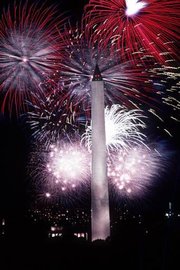Independence Day (United States)
|
|
Independence Day | ||
| Observed by: | Americans | |
| Also called: | Fourth of July | |
| Begins: | July 4 | |
| Occasion | Anniversary of the Declaration of Independence | |
| Symbols: | Fireworks, picnics | |
| Related to: | Memorial Day, Veterans Day, Flag Day | |

In the United States, Independence Day, also called the Fourth of July, is a federal holiday celebrating the adoption of the Declaration of Independence in 1776.
It is commonly associated with parades, barbecues, picnics and various public celebratory events. Fireworks have been associated with the Fourth of July since 1777.
| Contents |
History
Why the 4th?
Though the Fourth of July is almost iconic to Americans, some claim the date itself is somewhat arbitrary. New Englanders had been fighting Britain since April 1775. The first motion in the Continental Congress for independence was made on June 8. After hard debate, the Congress voted unanimously (12-0), but secretly, for independence from the Kingdom of Great Britain on July 2. The Congress reworked the text of the Declaration until a little after eleven o'clock, July 4th, when twelve colonies voted for adoption and released an unsigned copy to the printers. (New York abstained from both votes.) Philadelphia celebrated the Declaration with public readings and bonfires on July 8. Not until August 2 would a fair printing be signed by the members of the Congress, but even that was kept secret to protect the members from British reprisal.
John Adams, credited by Thomas Jefferson as the unofficial, tireless whip of the independence-minded, wrote his wife Abigail on July 3:
- The second day of July, 1776, will be the most memorable epocha in the history of America. I am apt to believe that it will be celebrated by succeeding generations as the great anniversary festival. It ought to be commemorated as the day of deliverance, by solemn acts of devotion to God Almighty. It ought to be solemnized with pomp and parade, with shows, games, sports, guns, bells, bonfires, and illuminations, from one end of this continent to the other, from this time forward for evermore.
Adams was off by two days, however. Certainly, the vote on July 2 was the decisive act. But July 4 is the date on the Declaration itself. Jefferson's stirring prose, as edited by the Congress, was first adopted by the vote of the 4th. It was also the first day Philadelphians heard the official news of independence from the Continental Congress, as opposed to rumors in the street about secret votes.
History of Observance
- In 1777, British officers noted the firing of 13 guns, once at morning and again as evening fell, on July 4 in Bristol, Rhode Island. Philadelphia celebrated the first anniversary in a manner a modern American would find quite familiar: an official dinner for the Continental Congress, toasts, 13-gun salutes, speeches, prayers, music, parades, troop reviews and fireworks. Ships were decked with red, white and blue bunting.
- In 1778, General George Washington marked the Fourth with a double ration of rum for his soldiers and an artillery salute. Across the sea, ambassadors John Adams and Benjamin Franklin held a dinner for their fellow Americans in Paris, France.
- In 1779, the Fourth falls on a Sunday. Starting a long tradition, the holiday is celebrated on Monday, July 5.
- In 1781, Massachusetts was the first legislature to recognize Independence Day.
- In 1870, the U.S. Congress made July 4 an unpaid holiday for federal employees.
Customs
Independence Day, as the only holiday celebrating the country as a whole, is a national holiday marked by patriotic displays. Many politicians make it a point on this day to appear at a public event to praise the nation's heritage and people. Families often mark the Fourth with a picnic or barbecue, and often gather in more distant relatives, taking advantage of the longer weekend. Parades are often held the morning of the 4th; the evening is usually marked by public displays of fireworks.
In many states, smaller fireworks are sold for personal use or as an alternative to a public show. Concerns about safety have led some states to ban fireworks or limit the sizes and types allowed, but illicit traffic brings some of the more powerful firecrackers in from less restrictive border states.
One colorful annual Independence Day event is the Nathan's Hot Dog Eating Contest in Coney Island, Brooklyn, New York City, which supposedly started on July 4, 1916 as a way to settle a dispute among four immigrants as to who was the most patriotic.
See also
- Many nations share with the U.S. the tradition of each celebrating their independence from foreign powers.
- The legality of state separation through a declaration of independence.
External links
- US State Department (http://usinfo.state.gov/usa/holidays/july4/) on Independence Day
- An extensive history (http://www.american.edu/heintze/fourth.htm) of Independence Day by James R. Heintze, American University, Washington, D.C.
